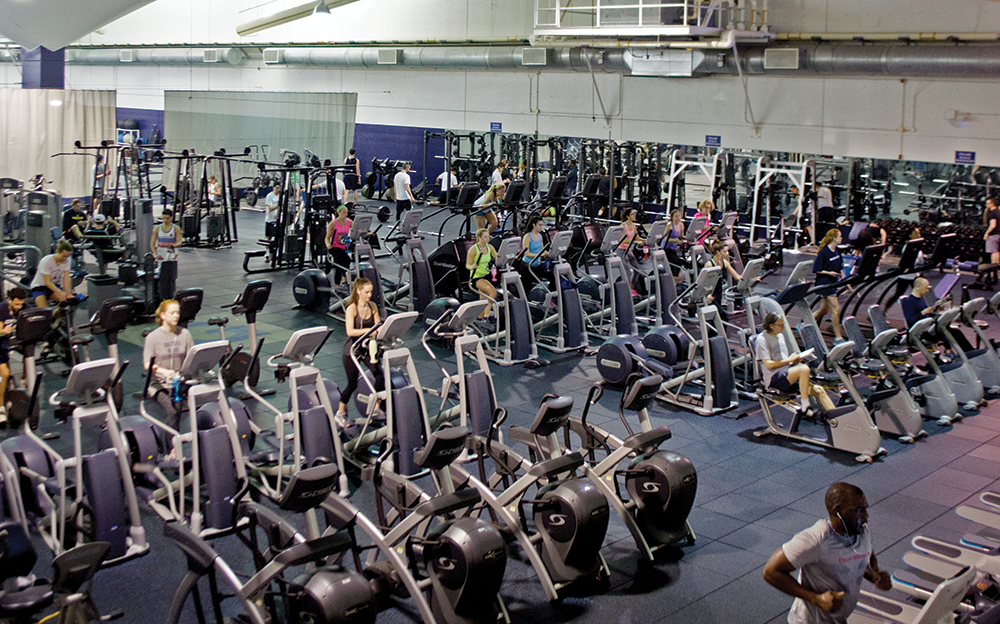With students returning to the now snow-laden Hilltop, the new semester presents some freedom to institute change but also the difficulty of follow-through. Though New Year’s Eve was only two weeks ago, some may have already broken one, if not all, of their New Year’s resolutions. Though resolutions present an opportunity within the secular world to emulate practices of religious holidays like Rosh Hashanah, their fleeting nature makes some students wonder whether these promises are worth making at all.
Happy New You
Though setting New Year’s resolutions is a common phenomenon — around 40 percent of Americans set resolutions every year, according to Forbes — some students on the Hilltop, like Harrison Loef (MSB ’21), question the arbitrary nature of the way the goal is set.
“If you want to make a change in your life, then you should just do it rather than using the New Year as a motivating factor,” Loef wrote.
What Loef fails to recognize is that some people appreciate the new year as the motivator to think of resolutions. Once these goals have been set, people can hold themselves accountable for how closely they stick to their promises over time, according to Eric Guajardo (SFS ’21).
“[New Year’s resolutions are] helpful in measuring your progress throughout the year,” Guajardo said. “It gives a sense of fulfillment if you follow through on your goals.”
That sense of fulfillment is one of the myriad reasons people set New Year’s resolutions, many of which revolve around a common theme: self-improvement. More often than not, these attempts are related to health or finances.

Around 55 percent of resolutions were related to exercise, eating better and other healthy lifestyle choices, according to the scientific journal Personality and Psychology Bulletin; an additional 20 percent were related to alleviating debts.
In October, an average of 3,440 people visited Yates Field House, while an average of 4,351 daily users have visited in January, wrote Meghan Dimsa, director of campus recreation in an email to The Hoya. In mid-December, with students taking finals and going home, that number drops to an average of 1,370, almost 3,000 less than January, according to Dimsa.
Other major resolutions were to be more organized and spend more time with family, which time management firm FranklinCovey found after polling more than 15,000 customers.
Empty Promises
These goals are noble in their intent, begging the question — why do people fall through in following them? Four out of five people break their new year’s resolutions by February, according to Business Insider. A third of people will not even last until the end of January before they break their resolutions, The New York Times reported.
Though it can be difficult to follow through on goals, a good approach is to avoid noncommittal words when establishing that we want to do something, according to Erin Falconer in her book “How To Get Sh*t Done.” Rather than using words like “should” when deciding on a resolution, people should say “will” or other more commanding words and phrases. This practice is especially helpful when certain resolutions can seem like too high a mountain to climb, like when healthier food does not taste very good. Rather than concentrate on the negative aspects, focusing on the reward — like the weight loss that results from healthier eating — of resolutions can help people follow through on them, which University of Maryland professor Seppo Iso-Ahola notes in her study.
Keeping the Faith
Though New Year’s resolutions may seem like a trivial tradition, they can yield deeper meaning to an otherwise insignificant time, according to campus faith leaders including Jewish Chaplain Rabbi Benjamin Barer.
“New Year’s resolutions are a great way to take advantage of an otherwise arbitrary passage of time, to pause and reflect about, like, what’s really important for me, what do I want to accomplish in this year, how do I want to change, how do I want to behave,” Barer said in an interview with The Hoya.
Barer characterized New Year’s resolutions as a rare chance for introspection.
“In the secular world, I feel like New Year’s is one of those few opportunities where it’s like, ‘No, we’re all going to pause, if we want to, and take advantage of the space that we have at the holidays, and even those of us who aren’t on semester schedules have a couple days, to reflect on the year and look forward to the year.’”
In these moments of reflection, resolutions speak to an attempt to think about the good in one’s life, as V. Rev. David Pratt, director of Orthodox Christian Life, believes. Not all resolutions are equal, though, according to Pratt. People should make a distinction between the finality of loftier resolutions and the more doable, everyday ones.
“I guess it’s, is it a big ‘R’ or a small ‘r?’ I’m all about small ‘r’ resolutions because sometimes we have to take baby steps,” Pratt said. “Sometimes we have to just succeed a little bit in an area before we can actually decide to make that a way of life.”
Often people fail to live up to their resolutions, but Pratt finds that the effort put into an attempt is where they can find value.
“We may have to fail in something quite a bit before we can actually start to get that good,” Pratt said. “It may be the case of some resolutions almost have it built in that there’s going to be breakdowns and fall-aparts, and the real test is ‘Can I pick up the pieces and go again?’”
While New Year’s resolutions may cause little difference to people’s lives, they actually have immense potential to create change. Barer has seen this within the traditions of Judaism such as the Jewish New Year, known as Rosh Hashanah, which promotes making resolutions through introspection.
“Judaism places a high value on New Year’s resolutions. So the Jewish New Year’s in the fall, and the month leading up to the Jewish New Year, is supposed to be dedicated to introspection and reflecting and thinking about how we can change ourselves in a — well, depending on how seriously one takes it on — in a pretty sustained, rigorous sort of way. like daily journaling, prayer, talking to those that we think that we have hurt or the relationships that we feel are not in the best place,” Barer said. “And if you spent a month doing that, then I actually think that that could change what you’re doing going forward.”
Pratt believes that many resolutions focus on the addictive aspects of people’s lives, like food or smoking. In creating resolutions, he hopes people work to reduce those addictions.
“So I guess what’s on my mind in reflection of New Year’s resolutions is ‘Can we diminish the addictions we’re living under?’” Pratt said.
Secular Solutions
While Barer has found his experience with resolutions to be closely tied to his faith, he does not believe that religion needs to be the motivator for everyone hoping to change their lives in 2019.
“I don’t think God’s necessary for any of these things to work,” Barer said.
Some secular holidays offer similar moments of reflection to the Jewish New Year when it comes to focusing on a value worth keeping in mind during the year, according to Barer.
“I don’t see it being any different when we’re talking about New Year’s or Thanksgiving or like the secular holidays,” Barer said. “Gratitude is obviously something that we should be thinking about, and Thanksgiving is ideally meant to facilitate that process.”
Students should evaluate all aspects of their lives when thinking of resolutions, according to Barer. Moreover, these moments of reflection do not have to happen under the pressure of the New Year: Change can occur at any time.

“There aren’t too many bad resolutions, like, if your resolution is ‘I really want to stop studying by 10 p.m. every night, so that I can actually enjoy what this campus has to offer,’ then I think that that’s a great resolution, too. Trying to recenter, rebalance, I think may be one of the core themes underlying any resolution,” Barer said.
For people who may find the pressure of creating New Year’s resolutions unnecessary, evaluating your life over the length of the whole year rather than suddenly at the holidays may be a better solution, says Barer.
“If you think that there’s actually value to checking in with yourself through any form and working on being a better person, which is basically what religion is here to help us do, then don’t leave it until Dec. 31. Do it on the first of every month or like with friends over drinks sometimes. The venue is secondary, as long as it helps you do that work in a comfortable, productive way,” Barer said.
Pratt also believes resolutions should not be restricted to the calendar.
“A New Year’s resolution really can be at any time, and the month of January, you ought to consider it not by the day, but by the month,” Pratt said. “You’ve still got half this month left to settle into something good, you know, but a doable good.”
Resolutions require a conscious effort, though, on the part of the person trying to make a change, according to Pratt.
“If you think about it, it [the good] has to be invited in; it’s not going to come crashing in,” Pratt said. “The bad does that; it doesn’t come invited. It’s uninvited, but the good has to be invited.”
If you are struggling to think of some worthwhile resolutions, though, Pratt has some suggestions.
“Go out and do something for the poor, start journaling, read a great piece of literature this year,” Pratt said.














